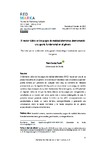El vector lúdico en los juegos de realidad alternativa: desmontando una aporía fundamental en el género

Use this link to cite
http://hdl.handle.net/2183/33965
Except where otherwise noted, this item's license is described as Atribución-CompartirIgual 4.0 Internacional
Collections
Metadata
Show full item recordTitle
El vector lúdico en los juegos de realidad alternativa: desmontando una aporía fundamental en el géneroAuthor(s)
Date
2023-06-26Citation
Ruiz-García, D. (2023). El vector lúdico en los juegos de realidad alternativa: desmontando una aporía fundamental en el género. Redmarka. Revista de Marketing Aplicado, 27(1), 21-39. https://doi.org/10.17979/redma.2023.27.1.9604
Abstract
[Resumen] El elemento lúdico en los juegos de realidad alternativa (ARG) resulta ser una de las piezas medulares de un género provisional por naturaleza. Esta circunstancia que bien podría tenerse por previsible en cualquier otro caso, se convierte en relevante precisamente por la negativa del dispositivo a reconocerse como juego, en sentido canónico. Bajo el amparo de su claim fundacional, This is not a game, los ARG plantean un régimen lúdico en el que los ítems clásicos de los juegos son transgredidos y camuflados en el mundo real como parte más o menos indistinguible de este. El presente trabajo pretende analizar lo lúdico en los ARG, conceptualizando sus peculiaridades a través un nuevo término, contragamificación, y generando una conversación entre la faceta normativa y la faceta disruptiva de un género acostumbrado a situarse en la frontera. [Abstract] The ludic element in alternate reality games (ARGs) turns out to be one of the core elements of a provisional genre by nature. This circumstance, which would be predictable in any other case, becomes relevant precisely because of the device's refusal to recognise itself as a game, in t he canonical sense. In keeping with their founding claim that This is not a game , ARGs propose a gaming regime in which the traditional features of games are transgressed and camouflaged as more or less indistinguishable parts of the real world. The aim of this article is to analyse the element of play in ARGs and conceptualise the genre under the term degamification , in order to explore the dialogue between the normative and disruptive facets of a medium used to occupying the borderland between reality and fiction, and between gaming and advertising.
Keywords
Branded content
Narrativa transmedia
Juegos de realidad alternativa
Branded entertainment
Gamificación
Contragamificación
Transmedia storytelling
Alternate reality games
Branded entertainment
Game studies
Gamification
Digamification
Narrativa transmedia
Juegos de realidad alternativa
Branded entertainment
Gamificación
Contragamificación
Transmedia storytelling
Alternate reality games
Branded entertainment
Game studies
Gamification
Digamification
Editor version
Rights
Atribución-CompartirIgual 4.0 Internacional
ISSN
1852- 2300






